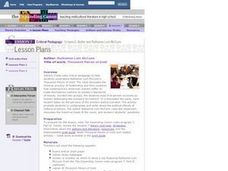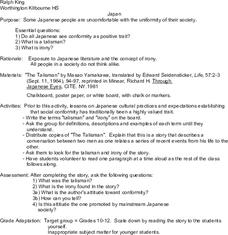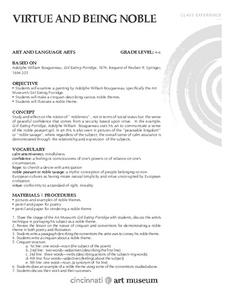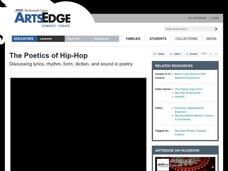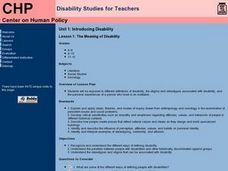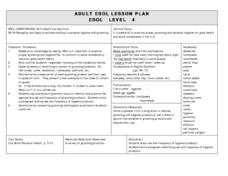Curated OER
Individuality vs. Conformity
Spark an animated debate in your class! Young adults consider some of the fads or trends that are prevalent at their school, as well as their own level of participation in them. Just how much of a role does popular culture play in their...
Curated OER
Critical Pedagogy
Students read Ruthanne Lum McCunn's Thousand Pieces of Gold and as a class, discuss the Chinese practice of foot binding. They work in groups to read further about how women of different cultures attempt to conform. They write about...
Curated OER
Student Opinion: Are You Popular, Quirky or Conformist?
Approach the topic of popularity with this resource from the New York Times and their Learning Network series. The article is about Alexandra Robbins' "Quirk Theory." Learners respond to the article excerpt either on paper or online....
Curated OER
Lesson: After Nature: Dystopia and Detournement
Werner Herzog's film, Lessons of Darkness is the topic of this lesson on art, politics, and culture. Learners discuss the concepts of utopia, dystopia, detournment, and Scorched Earth then compose a paper which describes dystopian reality.
Curated OER
Japan
Young scholars read the literature of The Talisman in order to make cultural connections and investigate the concept of irony and how it is used in this Japanese text. They also discuss the issue of conformity and its relationship to the...
Curated OER
"Kokoro (True Heart)" by Velina Hasu Houston
Students read and analyze a play that examines a cultural defense case. They analyze case studies, formulate an argument, write about the Japanese Festival of the Dead, and answer discussion questions about the play.
Curated OER
A Togolese Tale: The Big Fire
Students read a Tonolese folktale and outline the elements of the story. In groups, they discuss the various morals presented in the story and if they are unique to the Tonolese culture. To end the lesson, they identify the positives and...
Curated OER
English Vocabulary Skills: AWL Sublist 8 - Exercise 2b
In this online interactive English vocabulary skills worksheet, learners answer 10 matching questions which require them to fill in the blanks in 10 sentences. Students may submit their answers to be scored.
Curated OER
A Togolese Tale: The Big Fire
High schoolers identify common elements found in folk tales and read a Togolese folk tale told by Fred Koehler. They analyze the folk tale for its elements and compare and contrast it with well-known Western folk tales.
Curated OER
The Poetics of Hip Hop
The Bard, Nikki Giovanni, Mos Def? “Sonnet 18,” Ego Tripping,” and “Black on Both Sides”? Sure! It’s the poetics. Class members compare the lyrics, rhythm, and rhyme in classic poetry to hip-hop in a richly detailed resource that...
Curated OER
Gender Roles: Exposing Stereotypes
A series of activities help middle- and high-schoolers identify and explore gender stereotypes and how they can lead to violence and abuse. Use think-pair-share to activate whole class brainstorming about what it means to "be a man" and...
Macmillan Education
A Wrinkle in Time Discussion and Activity Guide
As you work through Madeleine L'Engle's A Wrinkle in Time, try out some or all of the 20 questions and activities included here. Useful for discussion questions, group assignments, or individual projects, this resource covers plot as...
Curated OER
“Self Reliance” Questions
Is consistency foolish? Or is “foolish consistency . . . the hobgoblin of little minds”? Ralph Waldo Emerson’s “Self Reliance” provides readers with an opportunity to reflect on their own musing about being self-reliant and about...
Curated OER
Virtue And Being Noble
Young scholars write and illustrate original cinquains based upon the ideas of nobility and virtue. The lesson includes a vocabulary list of key terms and rubric for student reflection and assessment. This is intended for a 4th through...
Curated OER
A Century of Challenge and Change: The Filipino American Story
Students recognize the events that led to the Philippine Revolution. In this Philippine Revolution lesson, students relate the causes of the Philippine Revolution to situation in the world today. Students examine the Philippine Equation...
Curated OER
The Poetics of Hip Hop
Students consider the role of rhythm, form, diction, and sound in poetry. For this integrated arts lesson, students discuss the attributes of poetry as they analyze Shakespearean sonnets, hip hop music lyrics, and poems by Nikki...
Curated OER
Still I Rise: Maya Angelou
Students read the poem, Still I rise, by Maya Angelou. They examine how language, poetic devices, and format contribute to the poet's message. They identify poetic devices used in the poem.
Curated OER
The Meaning of Disability
Students discover the different types of disabilities. They examine the stereotypes and stigmas associated with them and hear from a person who lived in an institution.
Curated OER
Personal Hygiene Products and Their Uses
Students explain the use and frequency of use of personal hygiene products by writing an essay explain their personal hygiene regimine and the products they use. This lesson is intended for students acquiring English.
Curated OER
A Woman's Story: The Autobiography of Mrs. Tom Thumb
Students examine the life of Lavinia Warren, the wife of Tom Thumb. They examine the impact of stereotyping and other behaviors by different groups. They examine roles and status in society as well.



